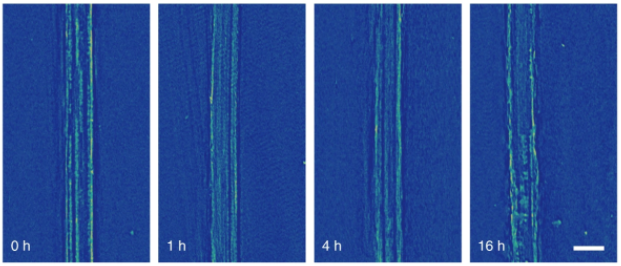Lithium metal batteries, in which the graphite material in the anode is swapped out for pure lithium metal, could be a game changer when it comes to energy storage, potentially offering far greater capacity and an ability to charge much faster. Scientists are reporting a new breakthrough in this area, demonstrating how an electrolyte made of soft and solid materials can prevent the formation of tree-like growths that normally prove fatal to the battery’s performance.
The reason lithium metal batteries are seen as such a promising technology in energy research circles is that pure lithium metal offers excellent energy density. This means they could offer as much as 10 times the capacity of today’s batteries, and possibly charge in just a fraction of the time.
One of the major roadblocks standing in the way, however, are troublesome, tentacle-like protrusions called dendrites. These form on the surface of the graphite anode as the battery charges and ultimately cause it to short-circuit, fail or catch fire. A lot of the focus in battery research centers on suppressing these growths, and we’ve seen a few promising solutions of late.
These have included incorporating protective layers into the anode to prevent dendrite growth, using scaffolds made of carbon nanotubes for the same effect, and even bringing adhesive tape into the mix.
The team behind the latest breakthrough, made up of scientists from the Lawrence Berkeley National Laboratory and Carnegie Mellon University, see the solution in a new class of soft, solid electrolytes. The electrolyte is the material that facilitates the movement of ions back and forth between the cathode and anode, and the team believes it may have come up with just the right recipe for use in lithium metal batteries.
The material consists of soft, porous polymers, with the tiny holes packed with nanoscale ceramic particles. This combination of soft and solid materials was put to the test in the lab, with the team using X-ray imaging to observe the interactions between lithium metal anode and electrolyte during up to 16 hours of operation.

Brett Helms/Berkeley Lab
This testing showed that the lithium remained smooth throughout, while another around of experiments, in which the so-called PIM composite electrolyte material wasn’t used, brought about “telltale signs” of early dendrite growth. The researchers believe the properties of the new dendrite-suppressing electrolyte lend themselves well to a range of applications, including high-density batteries for electric cars, trucks and eVTOL aircraft.
“Our dendrite-suppressing technology has exciting implications for the battery industry,” said co-author Brett Helms, a staff scientist in Berkeley Lab’s Molecular Foundry. “With it, battery manufacturers can produce safer lithium metal batteries with both high energy density and a long cycle life.”
The research was published in the journal Nature Materials.
Source: Lawrence Berkeley National Laboratory
"soft" - Google News
July 22, 2020 at 09:55AM
https://ift.tt/2BkyHgF
Soft, solid battery electrolyte could see EVs go great distances - New Atlas
"soft" - Google News
https://ift.tt/2QZtiPM
https://ift.tt/2KTtFc8
Bagikan Berita Ini














0 Response to "Soft, solid battery electrolyte could see EVs go great distances - New Atlas"
Post a Comment